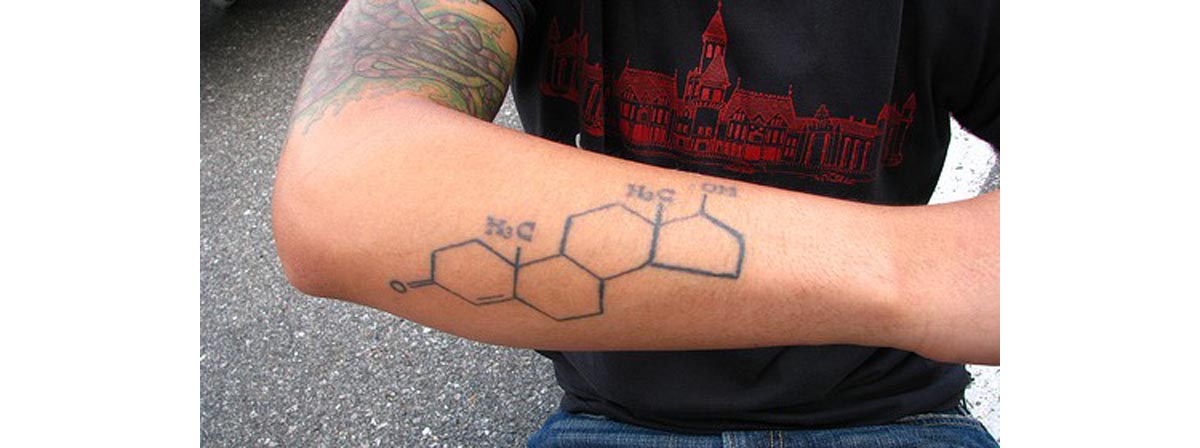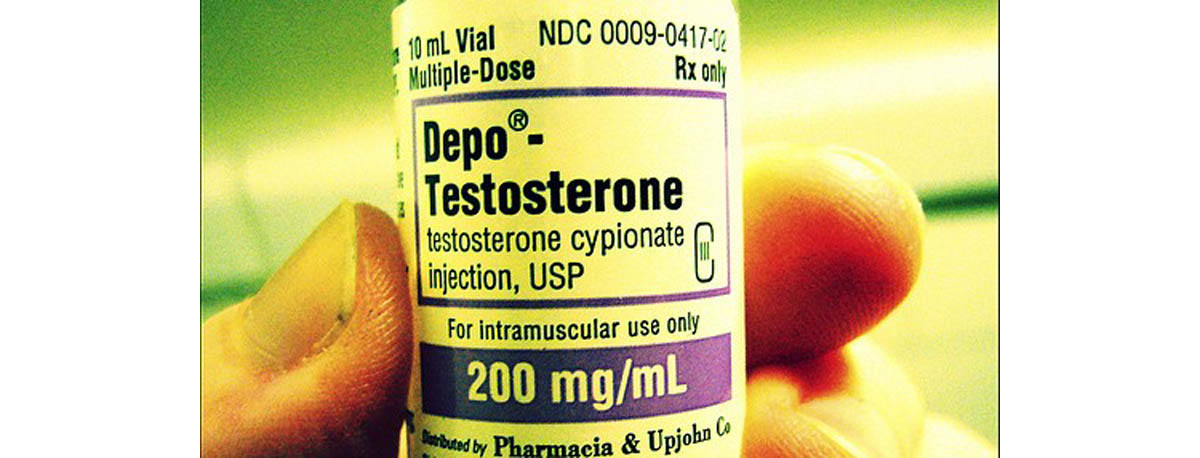Testosterone is the hormone of male sexual desire. Although women's bodies also make tiny amounts of testosterone, this androgen hormone is most commonly associated with the sexual characteristics that make men identifiable as men. These characteristics are body hair, aggressiveness, memory skills related to sex and competitive activities, and skin texture, with, of course, the size of the sexual organ and the interest and ability to use it.

"Lard Butt" Is the Enemy of Testosterone
Low testosterone is a common condition among men who have passed the age of 40. The single most important factor in most men's testosterone levels is fat mass. You may not know that fat cells do not just store fat. They also make hormones.
In men, body fat, especially buttocks fat, creates an enzyme called aromatase. This is an enzyme that can transform the male sex hormone testosterone into the female sex hormone estrogen. When men lounge around and stuff themselves while watching TV, they encourage the growth of body fat that can rob their bodies of testosterone.
Testosterone is essential for a man's sex drive. The areas of the brain that direct sex-seeking behavior are stimulated by testosterone. A burst of testosterone into the bloodstream has some astonishing effects when it reaches the brain.
- Testosterone increases the male brain's ability to interpret spatial relationships. This ability helps men find the right parts.
- Testosterone powers short-term memory in men. If a man needs to remember the right sweet nothing to whisper into his lover's ear, testosterone will help him do it.
- Testosterone also increases activity and aggression. Men who have higher testosterone levels are more inclined to seek new partners — and to fend off the competition.
In situations in which there is a possibility of sexual intercourse, the testes are triggered to release testosterone. Straight men get a boost in their testosterone just by talking to women. (It is not known whether gay men get a boost in testosterone levels by talking with other men at the moment.)
Straight men get a boost in their testosterone levels just by talking to women to whom they are not partnered, even if the conversation is by phone, in fact — so effective is this hormone. Both straight and gay men, it is interesting to note, experience lower levels of testosterone after spending 1 to 3 years in a stable relationship.
Testosterone Essential to Penis Size, Testicle Size, and Fertility
Testosterone is essential to male fertility, as it enables the testes to transform Leydig cells into sperm cells. It fuels the growth of the lining of the prostate, which releases seminal fluid to mix with sperm to become semen. And testosterone stimulates the growth and maintenance of penis and testicular tissue that keeps them their normal size.
There is absolutely no doubt that testosterone is essential for sex for men. Millions of men report a renaissance in their sex lives when they start taking injected testosterone or a testosterone patch. But maintaining a man's sex life is not the most urgent medical reason for treating low-T.
Seven Potentially Deadly Consequences Of Low Testosterone
Men don't just need testosterone for their sex lives. Some men by the age of 40, most men by the age of 60, and essentially all men by the age of 80 will experience consequences of chronically low testosterone levels that can have devastating effects on their health. Here are the seven most common consequences of chronically low testosterone levels in men.

1. Low testosterone levels increase a man's risk of Alzheimer's disease.
Men who have low testosterone levels at 60 are significantly more likely to have developed Alzheimer's disease by 80.
Testosterone stimulates the brain to seek sex. The older a man gets, the more his brain is the organ that enables him to maintain or acquire a sexual partner. This "brain training" may prevent men's risk of Alzheimer's disease and age-related dementia just like, for example, doing a jigsaw puzzle might.
2. Low testosterone increases a man's risk of depression.
Testosterone stimulates men to seek positions of dominance and mastery. Low testosterone levels cause men to be submissive and inactive, on the other hand. Men who have low testosterone levels avoid the activities that release the stress hormones epinephrine (also known as adrenalin) and norepinephrine, which stimulate the brain. All in all, these factors collude to result in a situation wherein men with low testosterone levels are more likely to develop clinical depression.
3. Low testosterone makes it more difficult to manage type 2 diabetes.
Testosterone stimulates the growth of muscle. Working a muscle to exhaustion, by lifting the heaviest weight the muscle can bear, or by working out so hard that the muscle begins to "burn" due to lack of oxygen, makes the muscle temporarily 50 times more sensitive to insulin. Muscles suck sugar out of the bloodstream so that they can then "pump up" with glycogen. The more muscle mass a man has, the more exercise lowers his blood sugar levels.
4. Low testosterone levels elevate a man's risk of having heart attack approximately 25%.
Heart attacks occur when narrowed coronary arteries are blocked by a blood clot. The formation of a blood clot begins with the release of a chemical called Platelet Activating Factor, which is also known as PAF. Researchers believe that testosterone mitigates the activation of PAF so that clots are less likely to form. The older a man is, the more important testosterone is for preventing blood clots and thereby, indirectly, also heart attacks.
5. Low testosterone levels increase a man's risk of prostate cancer.
It is a widely recognized fact that excessive testosterone levels can increase a man's risk of developing prostate cancer. Low testosterone, however, also increases prostate cancer risk, and testosterone replacement therapy (patch or shot) is not harmful if the dosage is medically monitored.
6. Low testosterone levels increase a man's risk of high blood pressure.
Researchers have found that slightly above-normal testosterone levels are associated with lower blood pressure and fewer cases of hypertension. This may be due to the inhibition of platelet activating factor, preventing the formation of microscopic blood clots that block small blood vessels and raise blood pressure.
7. Low testosterone levels increase a man's risk of obesity.
When the muscles don't use excess glucose to make the glycogen that gives them bulk, that glucose gets turned into glycogen in fat cells instead. Lower testosterone levels lead to more body fat, and more body fat in turn leads to the production of enzymes that convert testosterone into the female sex hormone estrogen. The sooner a man is able to lose weight, the lower the risk of a spiral of ever-increasing weight and ever-decreasing testosterone levels.
Treating low-T is essential to a man's health. Low testosterone is about so much more than sex drive alone. While the needle used for testosterone injections is large enough that most men won't be able to give themselves the shots, testosterone patches are available to provide painless testosterone supplementation 24 hours a day.
Do not, however, waste your money on any products that claim to provide testosterone by mouth, especially scammy workout pills that you will readily find advertised all over the internet. Orally administered testosterone breaks down during digestion and never reaches the target tissues that need it, thereby rendering it completely useless.
- Bassil N, Alkaade S, Morley JE (June 2009). The benefits and risks of testosterone replacement therapy: a review Ther Clin Risk Manag 5 (3): 427–48.
- Metter EJ, Tobin JD, Pearson J, Blackman MR, Longitudinal effects of aging on serum total and free testosterone levels in healthy men. Baltimore Longitudinal Study of Aging. J Clin Endocrinol Metab. 2001. 86:724–731,
- Photo courtesy of linden_tea on Flickr: www.flickr.com/photos/linden_tea/4564568606/

